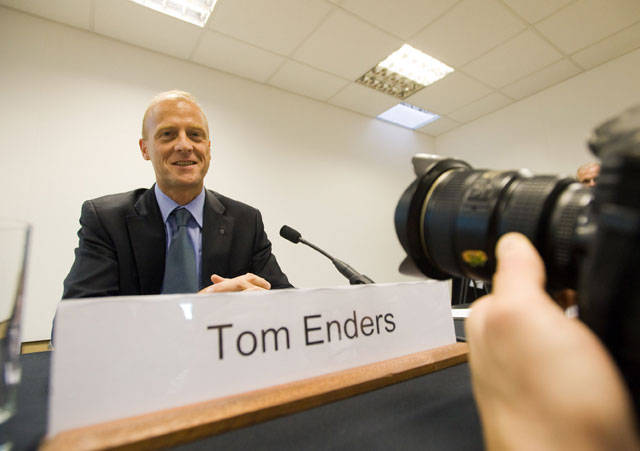Airbus parent EADS is poised to reveal a dramatic rise in profitability, having netted more than €2.1 billion ($2.8 billion) for shareholders last year, up from little more than €1 billion in 2011 and only €533 million in 2010.
The figures, to be revealed on 27 February, look to be at the high end of EADS guidance. Results issued by key shareholder Daimler show its approximately 15% share of the 2012 net profit of EADS amounted to €307 million, more than twice the €143 million it received in 2011.
EADS is unable to comment yet on 2012 performance, but revenue has risen steadily for several years to €49.1 billion in 2011, and Airbus in 2012 delivered a record 588 aircraft. However, profitability has been low and Louis Gallois, who retired in 2012 as chief executive, had made improvement a priority. Although the group's "Vision 2020" bid to reduce its reliance on Airbus - historically accounting for some two-thirds of sales - has been thwarted by a booming civil aircraft market, analysts have praised cost reduction efforts.
 |
|---|
Rex Features Listen carefully |
Astrium and Eurocopter are stars, too, and both have been in the ascendancy for several years.
The Cassidian defence unit, however, is another story - which Gallois' successor, former Airbus boss Tom Enders, will be pressed to address when he takes to the stage for the first time as chief executive to detail 2012's results.
Since taking office, Enders has made two strategic thrusts - one failed and one spectacularly successful - that have placed him at the focal point of the global defence aerospace industry, a position that would have seemed fanciful even six months ago.
His bold September bid to merge EADS with the UK's BAE Systems and create the world's biggest aerospace group failed to find favour with many investors. It was thwarted by the German government which, alongside Paris, effectively controls EADS. Berlin is believed to have feared its national defence industry interests would lose out to a Franco-British axis in an EADS-BAE combination. However, like a judo master Enders quickly exploited Berlin's momentum to achieve a strategic victory - by pushing the shareholding governments out of the EADS management loop.
NEW DEAL
As Daimler's 2012 results reveal, this new EADS governance deal - arising from astonishment that politicians could so blatantly thwart the will of management and investors - is already shifting the European industrial landscape. In the first week of December, only hours after the French and German governments agreed to cede control of the European aerospace champion, the auto maker behind the Mercedes-Benz brand realised €709 million from the €1.66 billion sale of a 7.5% stake - half of its remaining holding in EADS - to institutional investors and German banks.
Daimler has long made clear it wants to end its days as proxy holder of Germany's EADS stake to focus on its core business. The new deal frees it to do that - as it does Daimler's equally-reluctant French counterpart, Lagardère.
EADS itself is unlikely to pursue another mega-merger soon, but its dalliance with BAE has surely focused minds in other European boardrooms; transformative deals involving big players Safran, Thales and Finmeccanica have been discussed for years and may now look timely.
Reaction in the USA may be equally disruptive. As consultants PwC concluded earlier in February in their 2012 aerospace mergers and acquisitions report, uncertainty surrounding the US government's ongoing political battle over spending cuts is holding back a wave of defence industry consolidation.
PwC's US aerospace lead Scott Thompson told Flight International that while the Department of Defense has made clear it does not support further mergers between US prime contractors, that position predates the financial crisis. If US defence spending is cut drastically in any eventual resolution of the federal budget sequestration stand-off, then some companies will surely be prepared to explore the prospect of changing that DoD position in a new economic environment, says Thompson. The fact that one of those primes - BAE - was prepared to enter a transformative deal will have got its rivals thinking about their strategic options.
Managers itching to cut loose that wave of deal-making will be tuned to Tom Enders' handling of questions about EADS's defence sector strategy - which, ironically, he will field in Berlin.
Source: Flight International























